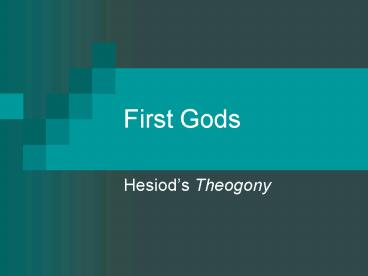First Gods PowerPoint PPT Presentation
1 / 34
Title: First Gods
1
First Gods
- Hesiods Theogony
2
Greek Influence on Roman Religion
- Greeks were a much older civilization (height of
their civilization was 5th century BCE) - Romans, when they conquered the Greeks in the 146
BCE, were very impressed by the art and
literature of the Greeks. This art and
literature was highly influenced by their
mythology/religion, so the Romans incorporated
much Greek religion as their own religious
beliefs. Romans were also influenced by the
Etruscans who lived in Northern Italy and
followed Greek religion.
3
Hesiods Theogony
- Hesiod was Greek poet born in the 700s BCE. He
wrote (or simply wrote down) two poems, the
Theogony and Works and Days. - The Theogony outlines the Birth of the Gods,
but since the Greeks believed the gods
represented the universe and all things in it,
this also is a story about the Birth of the
Universe or cosmogony (Like Genesis it is a
creation story)
4
Theogony
- Lines 117 - 289
5
(No Transcript)
6
(No Transcript)
7
(No Transcript)
8
(No Transcript)
9
(No Transcript)
10
(No Transcript)
11
(No Transcript)
12
(No Transcript)
13
(No Transcript)
14
(No Transcript)
15
(No Transcript)
16
(No Transcript)
17
(No Transcript)
18
(No Transcript)
19
(No Transcript)
20
(No Transcript)
21
(No Transcript)
22
(No Transcript)
23
(No Transcript)
24
(No Transcript)
25
(No Transcript)
26
Highlights from the Theogony
- In the beginning, there was
- Abyss
- Gaia earth (Tellus)
- Tartaros underground
- Eros love as creative energy/force (Cupid)
27
Highlights from the Theogony (contd)
- Gaia, by parthenogenesis, gave birth to
- Ouranos starry heaven (Uranos)
- Mountains
- Sea
28
Highlights from the Theogony (contd)
- Gaia coupled with Ouranos and bore
- The Titans overreaching
- including in this number Kronos/Cronus (Saturn)
and Rheia/Rhea (Magna Mater) - The Cyclopes
- The Hundred-handers
- Ouranos (Uranus), however, pushed these children
back into Gaia (Tellus) because he feared an
loathed them. Kronos (Saturn) finally castrated
his father and set himself and his siblings free.
29
Highlights from the Theogony (contd)
- The castration of Ouranos created
- From the blood
- Furies
- Giants
- Meliai
- From the genitals
- Aphrodite (Venus)
30
Highlights from the Theogony (contd)
- Kronos forced himself on Reia and produced the
Olympians - Hestia (Vesta) Demeter (Ceres)
- Hera (Juno) Hades (Pluto)
- Poseidon (Neptune) Zeus (Jove/Jupiter)
- Kronos (Saturn), however, afraid to be overthrown
by one of his children, swallowed his children as
soon as they were born. Zeus (Jupiter), having
been hidden away by his mother, eventually
tricked Kronos (Saturn) into throwing up his
siblings.
31
Highlights from the Theogony (contd)
- Titanomachy
- Kronos (Saturn) was not happy with Zeus (Jupiter)
and gathered the other Titans against Him and his
siblings (Olympians). - Zeus freed the hundred-handers and the Cyclopes.
He received the lightning bolt from the Cyclopes
and with the fighting power of the
hundred-handers and the Olympians, defeated the
Titans and kept them from overtaking Mount
Olympus. - Atlas, as leader of the Titans, forced to
support the sky because he did not support
Zeus and Titans are imprisoned in Tartaros.
32
Highlights from the Theogony (contd)
- Zeus will have to go through a few more trials
before gaining power, but that is for next time
33
Interpretations
- How is this world created?
- How is this story patriarchal?
- Is there evolution in this story and its
characters? - How does this story mimic nature?
- What does this story tell us about the Greeks?
34
(No Transcript)

